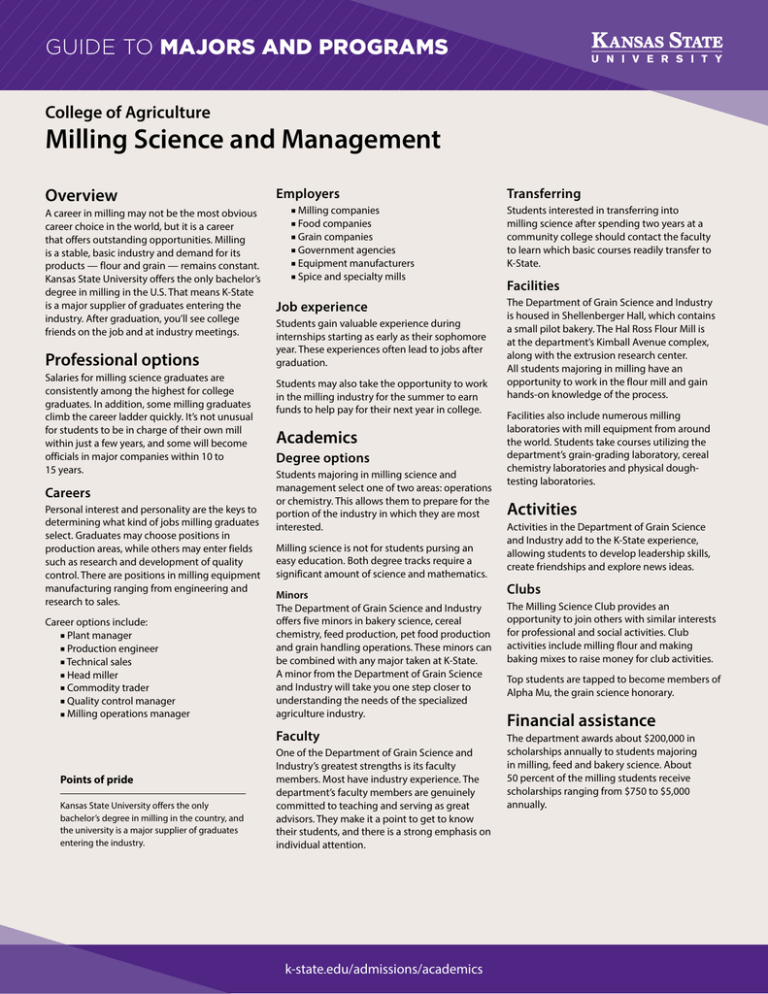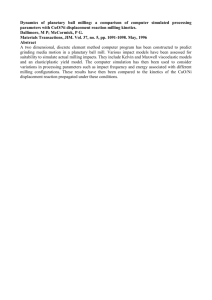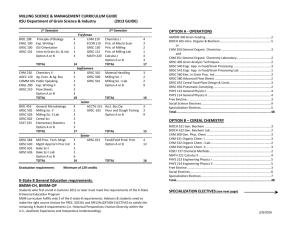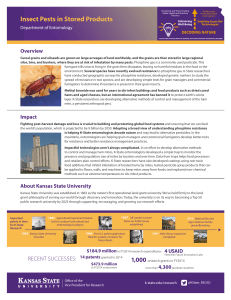
GUIDE TO MAJORS AND PROGRAMS
College of Agriculture
Milling Science and Management
Overview
A career in milling may not be the most obvious
career choice in the world, but it is a career
that offers outstanding opportunities. Milling
is a stable, basic industry and demand for its
products — flour and grain — remains constant.
Kansas State University offers the only bachelor’s
degree in milling in the U.S. That means K-State
is a major supplier of graduates entering the
industry. After graduation, you’ll see college
friends on the job and at industry meetings.
Professional options
Salaries for milling science graduates are
consistently among the highest for college
graduates. In addition, some milling graduates
climb the career ladder quickly. It’s not unusual
for students to be in charge of their own mill
within just a few years, and some will become
officials in major companies within 10 to
15 years.
Careers
Personal interest and personality are the keys to
determining what kind of jobs milling graduates
select. Graduates may choose positions in
production areas, while others may enter fields
such as research and development of quality
control. There are positions in milling equipment
manufacturing ranging from engineering and
research to sales.
Career options include:
n Plant manager
n Production engineer
n Technical sales
n Head miller
n Commodity trader
n Quality control manager
n Milling operations manager
Employers
Milling companies
n Food companies
n Grain companies
n Government agencies
n Equipment manufacturers
n Spice and specialty mills
n
Job experience
Students gain valuable experience during
internships starting as early as their sophomore
year. These experiences often lead to jobs after
graduation.
Students may also take the opportunity to work
in the milling industry for the summer to earn
funds to help pay for their next year in college.
Academics
Degree options
Students majoring in milling science and
management select one of two areas: operations
or chemistry. This allows them to prepare for the
portion of the industry in which they are most
interested.
Milling science is not for students pursing an
easy education. Both degree tracks require a
significant amount of science and mathematics.
Minors
The Department of Grain Science and Industry
offers five minors in bakery science, cereal
chemistry, feed production, pet food production
and grain handling operations. These minors can
be combined with any major taken at K-State.
A minor from the Department of Grain Science
and Industry will take you one step closer to
understanding the needs of the specialized
agriculture industry.
Faculty
Points of pride
Kansas State University offers the only
bachelor’s degree in milling in the country, and
the university is a major supplier of graduates
entering the industry.
One of the Department of Grain Science and
Industry’s greatest strengths is its faculty
members. Most have industry experience. The
department’s faculty members are genuinely
committed to teaching and serving as great
advisors. They make it a point to get to know
their students, and there is a strong emphasis on
individual attention.
k-state.edu/admissions/academics
Transferring
Students interested in transferring into
milling science after spending two years at a
community college should contact the faculty
to learn which basic courses readily transfer to
K-State.
Facilities
The Department of Grain Science and Industry
is housed in Shellenberger Hall, which contains
a small pilot bakery. The Hal Ross Flour Mill is
at the department’s Kimball Avenue complex,
along with the extrusion research center.
All students majoring in milling have an
opportunity to work in the flour mill and gain
hands-on knowledge of the process.
Facilities also include numerous milling
laboratories with mill equipment from around
the world. Students take courses utilizing the
department’s grain-grading laboratory, cereal
chemistry laboratories and physical doughtesting laboratories.
Activities
Activities in the Department of Grain Science
and Industry add to the K-State experience,
allowing students to develop leadership skills,
create friendships and explore news ideas.
Clubs
The Milling Science Club provides an
opportunity to join others with similar interests
for professional and social activities. Club
activities include milling flour and making
baking mixes to raise money for club activities.
Top students are tapped to become members of
Alpha Mu, the grain science honorary.
Financial assistance
The department awards about $200,000 in
scholarships annually to students majoring
in milling, feed and bakery science. About
50 percent of the milling students receive
scholarships ranging from $750 to $5,000
annually.
Suggested coursework
Milling science and management
(Minimum of 129 credits)
Freshman fall semester (14 credits)
HrsCourse
4 BIOL 198 Principle of Biology
3 ENGL 100 Expository Writing I
1 GRSC 100 Grain Science Orientation
3 GRSC 101 Intro to Grain Science and Industry
3 Option A or B
Freshman spring semester (17 credits)
4 CHM 210 Chemistry I
3 ECON 110 Principles of Macro Econ
2 GRSC 150 Principles of Milling
1 GRSC 151 Principles of Milling Lab
4 MATH 220 Calculus I
3 Option A or B
Sophomore fall semester (18 credits)
4 CHM 230 Chemistry II
3 AGEC 120 Agriculture Economics and Agriculture Business
2 COMM 105 Public Speaking
3 ENGL 200 Expository Writing II
3 GRSC 210 Flow Sheets
3 Option A or B
Sophomore spring semester (16 credits)
3
2
2
9
GRSC 310 Material Handling
GRSC 500 Milling Science I
GRSC 501 Milling Science I Lab
Option A or B
Junior fall semester (17 credits)
4
2
2
3
3
3
BIOL 455 General Microbiology
GRSC 502 Milling Science II
GRSC 503 Milling Science II Lab
GRSC 602 Cereal Science
STAT 325 Elementary Statistics
Option A or B
Junior spring semester (15 credits)
3 ACCTG 231 Accounting Business Operations
3 GRSC 625 Flour and Dough Testing
9 Option A or B
Senior fall semester (16 credits)
3 GRSC 584 Mill Processing Technology Management
3 GRSC 630 Management Applications in the Grain Processing Industries
2 GRSC 635 Bakery Science I
2 GRSC 636 Bakery Science I Lab
6 Option A or B
Senior spring semester (16 credits)
4 GRSC 651 Food and Feed Product Protection
12 Option A or B
Option A: Operations (48 credits)
2 AGRON 340 Grain Grading
5 BIOCH 265 Intro. Organic and Biochem
or
3 CHM 350 General Organic Chemistry
and
2 CHM 351 General Organic Chemistry Laboratory
2 GRSC 405 Grain Analysis Techniques
3 GRSC 540 Engineering Applications in Food/
Grain Processing
1 GRSC 541 Engineering Applications in Food/
Grain Processing Lab
3 GRSC 560 Electricity and Its Control for the Grain Processing Industry
2 GRSC 580 Advanced Flow Sheets
3 GRSC 555 Cereal Food Plant Design and Construction
2
4
4
3
9
5
GRSC 556 Pneumatic Conveying
PHYS 113 General Physics I
PHYS 114 General Physics II
Free elective
Social science electives
Specialization electives
Option B: Cereal Chemistry (48 credits)
3
2
3
3
2
3
2
4
5
5
3
6
7
BIOCH 521 General Biochemistry
BIOCH 522 General Biochemistry Lab
CHM 500 General Physics Chemistry
CHM 531 Organic Chemistry I
CHM 532 Organic Chemistry I Lab
CHM 550 Organic Chemistry II
FDSCI 727 Chemical Methods
MATH 221 Calculus II
PHYS 213 Engineering Physics I
PHYS 214 Engineering Physics II
Free elective
Social electives
Specialization electives
K-State 8 general education requirements
BMSM-CH, BMSM-OP
Students who first enroll in summer 2011 or later
must meet the requirements of the K-State 8 general
education program. MSM curriculum fulfills only five
of the K-State 8 requirements. Advisors and students
need to make the right course choices for free, social
and specialization electives to satisfy the remaining
K-State 8 requirements (i.e. Historical Perspectives;
Human Diversity within the U.S.; Aesthetic Experience
and Interpretive Understanding).
Specialization electives
ACCTG 231 Accounting for Business Operations (Chm Opt) 3 ACCTG 241 Accounting Invest and Finance
4 ACCTG 331 Accounting Processes and Controls (Opr Opt)
3 AGEC 318 Food and Agribusiness Management
3 AGEC 420 Commodity Futures
3 AGEC 500 Production Economics
3 AGEC 513 Agricultural Finance
3 AGEC 515 Food and Agribusiness Marketing
3 1AGEC 520 Market Fundamentals and Futures/
Options Trading
3 2AGEC 632 Agribusiness Logistics
2 AGRON 340 Grain Grading (Chemistry Option)
4 CHM 371 Chemical Analysis
3 3COMM 311 Business and Professional Speaking
3 ENGL 516 Written Communication for the Sciences
1 GRSC 201 Fundamental Baking Calculations
0-3 GRSC 499 Undergraduate research in Grain Science
3 GRSC 560 Electricity and Its Control for the Grain Processing Ind (Chemistry Option)
3 GRSC 580 Advanced Flow Sheets (Chemistry Option)
4 GRSC 620 Extrusion Processing in the Food and Feed Industries
1-3 GRSC 491 Faculty-Led Study Abroad
1-2 GRSC 712 Vibrational Spectroscopic Analysis and Chemometrics
1 GRSC 713 Contemporary Chromatographic Analysis of Food
3 GRSC 745 Fundamentals of Bioprocessing
3 4MANGT 390 Business Law I
3 MANGT 420 Management Concepts
3 5MANGT 530 Industrial and Labor Relations
3 6MANGT 531 Human Resources Management
3
Ethical Reasoning and Responsibility
Historical Perspectives
3
Aesthetic Experience and Interpretive Understanding
and Ethical Reasoning and Responsibility
4
Ethical Reasoning and Responsibility
5
Historical Perspectives
6
Human Diversity within the U.S.
1
2
Please check k-state.edu/kstate8/lists for a complete
list of courses tagged for one or two of the K-State 8
areas.
For more information about
milling science and management,
contact:
Department of Grain Science
and Industry
Kansas State University
201 Shellenberger Hall
1301 Mid-Campus Drive North
Manhattan, KS 66506-2201
785-532-6161
grains@k-state.edu
grains.k-state.edu
For more information about
Kansas State University, contact:
Office of Admissions
Kansas State University
119 Anderson Hall
919 Mid-Campus Drive North
Manhattan, KS 66506-0102
1-800-432-8270 (toll free) or
785-532-6250
k-state@k-state.edu
k-state.edu/admissions
Notice of nondiscrimination
Kansas State University prohibits discrimination on the basis of race, color,
ethnicity, national origin, sex (including sexual harassment and sexual violence),
sexual orientation, gender identity, religion, age, ancestry, disability, genetic
information, military status, or veteran status, in the University’s programs and
activities as required by applicable laws and regulations. The person designated
with responsibility for coordination of compliance efforts and receipt of inquiries
concerning nondiscrimination policies is the University’s Title IX Coordinator: the
Director of the Office of Institutional Equity, equity@k-state.edu, 103 Edwards Hall,
Kansas State University, Manhattan, Kansas 66506, (785) 532-6220. The campus
ADA Coordinator is the Director of Employee Relations, charlott@k-state.edu, who
may be reached at 103 Edwards Hall, Kansas State University, Manhattan, Kansas
66506, (785) 532-6277.
2016





